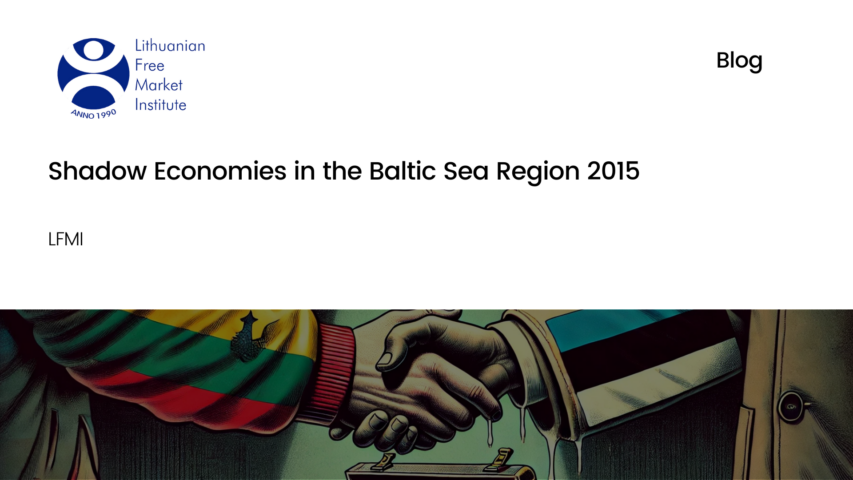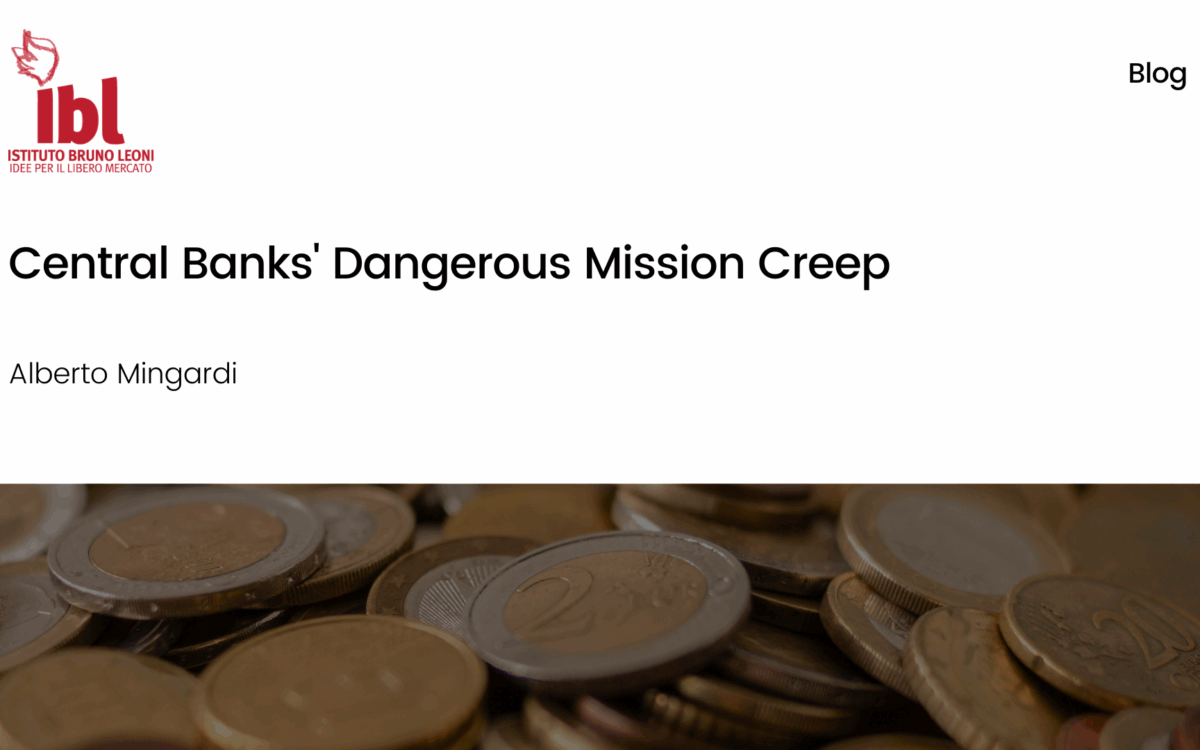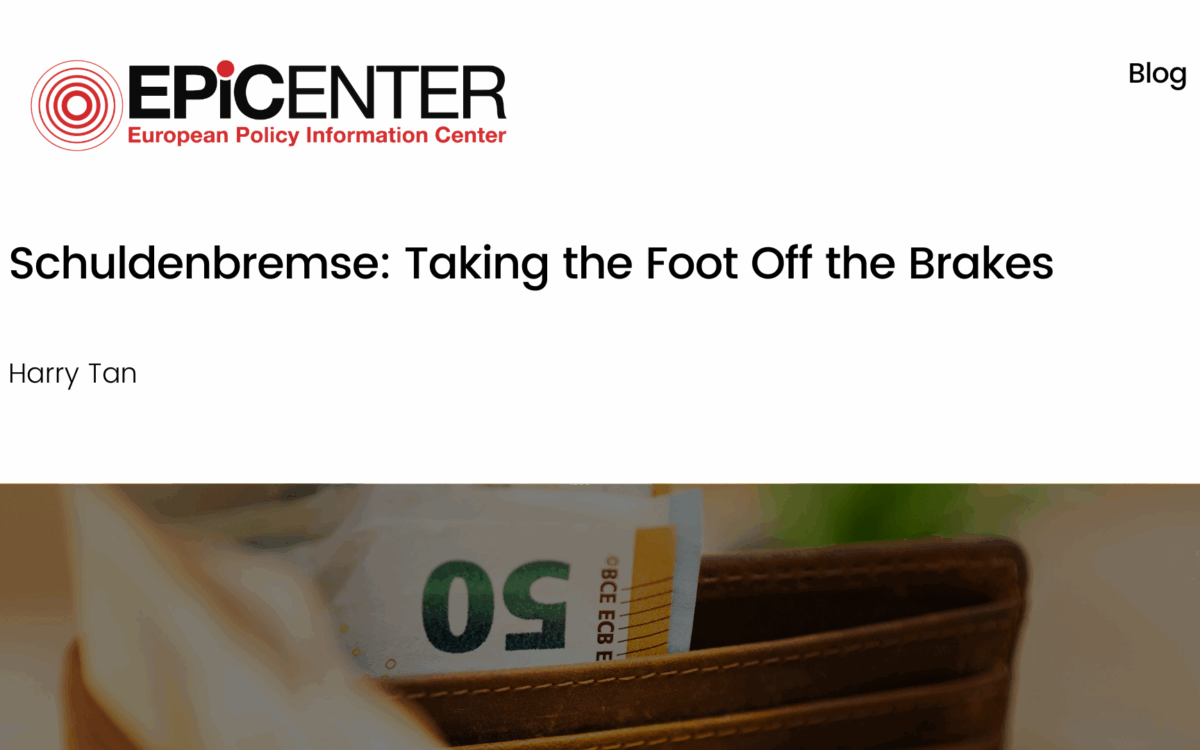Shadow Economies in the Baltic Sea Region 2015

Shadow Economies in the Baltic Sea Region 2015
The Lithuanian Free Market Institute // 25.11.2015
A new report by the Lithuanian Free Market Institute looks at perceptions and prevalence of the shadow economy in the Baltic Sea region. The shadow economy can be defined as the economic activity conducted outside of a country’s official economy, such as black market transactions and undeclared work. The study, conducted in six Baltic Sea region countries (Lithuania, Latvia, Estonia, Poland, Sweden, and Belarus), shows that the main drivers of shadow economies are economic restrictions, such as taxes and regulation. It investigates the public perception of shadow economies, engagement in illegal economic activities, and drivers of shadow economies, to draw policy recommendations. The study argues that the fight against the shadow economy will be most effective when the economic activity and value generated in the illegal sector is not eradicated, but rather transferred to the formal sector. This can be achieved by eliminating the incentives in the formal sector to participate in shadow economies.
The first part of the study looks at the public’s perception of and experience with the shadow economy in each of the countries where surveys were conducted. Interestingly, 53 to 78 per cent of respondents in Belarus and Lithuania respectively perceive the risk of detection in participating in illegal activities as quite low to very low, except for Sweden where 71 per cent perceive it to be quite high to very high. However, 74 per cent of Swedish respondents perceive the punishment if detected as quite mild to very mild. In contrast, punishment is seen as more severe in the countries where risk is perceived as much lower.
Most people do not justify any shadow activity – Latvia has the highest percentage, 42 per cent, of respondents who tend to or completely justify such actions and Sweden the lowest at 5 per cent – but see being paid an “envelope wage” in an otherwise legal job as the most justified, which was also the most common experience with the shadow labour market among the surveyed. At 36 per cent, Latvia has the highest proportion of respondents who have friends or relatives working in the shadow labour market and Sweden has the lowest at 8 per cent. Smuggling and the illegal production and sale of alcohol, cigarettes and fuel received the least justification. Survey respondents pinpointed the high costs of legal goods and services, buyer unawareness, high labour taxes, and a dissatisfaction with government services as the main drivers of shadow activities.
The analysis of the drivers of shadow economies show that higher taxes and more stringent regulations encourage engagement with the shadow economy. The shadow economy would not exist without restrictions on legal economic activity. Social, economic, and legal factors, such as local standards of living, a country’s economic position, public tolerance of the shadow economy, laws regulating the activities of the shadow economy, determine to what extent high taxes and economic regulation influence the shadow economy. Furthermore, taxpayers’ morality – their willingness and determination to pay taxes – depends on the quality of public services, their satisfaction with public policy and the fairness of public institutions. Therefore, fairly administered and non-corrupt tax collection would lead to higher taxpayer morality and reduce tax avoidance, i.e. participation in the shadow economy.
In Latvia, shadow economy participation is driven by the perception that punishment and risk of detection are weak. 60 to 70 per cent of respondents believe that the likelihood of being detected is either quite low or very low. Furthermore, a strong dissatisfaction with the tax system and public spending justifies the shadow economy in the public’s eye. 36.2 to 44.2 per cent of firms reported to be “very unsatisfied” with government aid for the business sector and tax policy respectively.
Estonia has a very high tax burden on the labour market at 40 per cent, putting the tax wedge above the OECD average of 36 per cent. This drives the prevalence of “envelope wages,” and, as in Latvia, a high dissatisfaction with the government incentivises shadow practices.
A prevalent perception that legal goods and services are too expensive leads to unregistered purchases in Lithuania where the average monthly expenses on basic goods and services account for 44 per cent of the average household income. This Baltic state has the lowest level of affordability in the EU besides Romania and Bulgaria, making the black market, where the price of a good can be 14 to 15 per cent of the official retail price, quite tempting. Lithuania’s inflexible labour regulations, which rank 127th out of 183 countries on flexibility, also incentivise greater participation in the shadow economy.
In Poland, taxation is highly complex and unstable, and reported as the biggest obstacle by businesses. Poland ranked 87th in World Bank’s Doing Business index in the ease of paying taxes due to the length of the process, which requires multiple payments. Administrative costs are much higher, amounting to 6 per cent of GDP, than the average of 3.5 per cent in other countries, thereby driving many enterprises and workers to the shadow economy.
In Sweden, the shadow economy and illegal labour market are ways to circumvent the country’s high taxes, extensive bureaucracy and overly stringent labour market regulations. Alcohol, for example, can only be bought in government-run stores with limited work hours and cannot be bought by people under 20, thereby increasing the demand to buy alcohol from other available and cheaper sources. Sweden also has the lowest number of low-paying jobs in the EU, which has led to unemployment concentrating among people with low education levels and/or little experience. They may then pursue low-income jobs in the shadow economy.
Low salaries and high payroll taxes are driving undeclared labour in Belarus. 65 per cent of respondents see the higher wages from undeclared labour, given the high taxes on labour, as the main reason for illegal employment and “envelope wages”. As for illegal purchases, 54 per cent of respondents indicated the high cost of legal products as the main reason.
In conclusion, the publication presents four categorized policy recommendations to curb the shadow economy and transfer the illegal economic activity to the formal sector:
¬ A favourable legal environment for legal economic activities can be created by reducing the primary causes of the shadow economy. This includes tax reduction and deregulation of legal activities to incentivise transparency.
¬ Secondly, the risks and punishments of participating in the shadow economy need to be increased. As the surveys showed, a lot of shadow participation was driven by the public’s low perception of risk of detection and weak punishment if detected.
¬ Public awareness of the shadow economy needs to be raised and the public’s tolerance of illegal activities diminished because engagement in the shadow economy depends on public attitudes towards it and the perception of it. This could be done through publicity campaigns targeting youth and those involved in the shadow labour market.
¬ Lastly, the shadow economy can be eradicated by increasing personal income and the standard of living. The study shows that a lot of shadow economy activity is driven by high prices and low affordability. In countries with stronger economies, and higher average incomes and standards of living, taxes and regulations drive less engagement in the shadow economy. This can be achieved by policy changes ensuring conditions that accelerate economic growth and improve conditions for economic activity, investment, and increased labour productivity.
You can find out more about the Lithuanian Free Market Institute at http://en.llri.lt/
EPICENTER publications and contributions from our member think tanks are designed to promote the discussion of economic issues and the role of markets in solving economic and social problems. As with all EPICENTER publications, the views expressed here are those of the author and not EPICENTER or its member think tanks (which have no corporate view).



